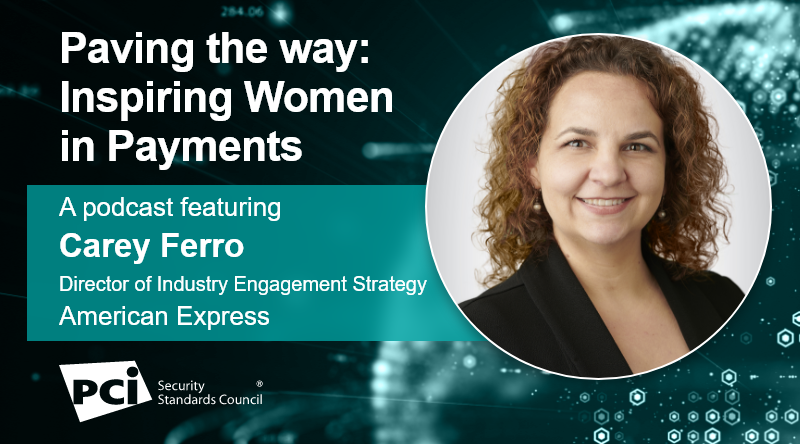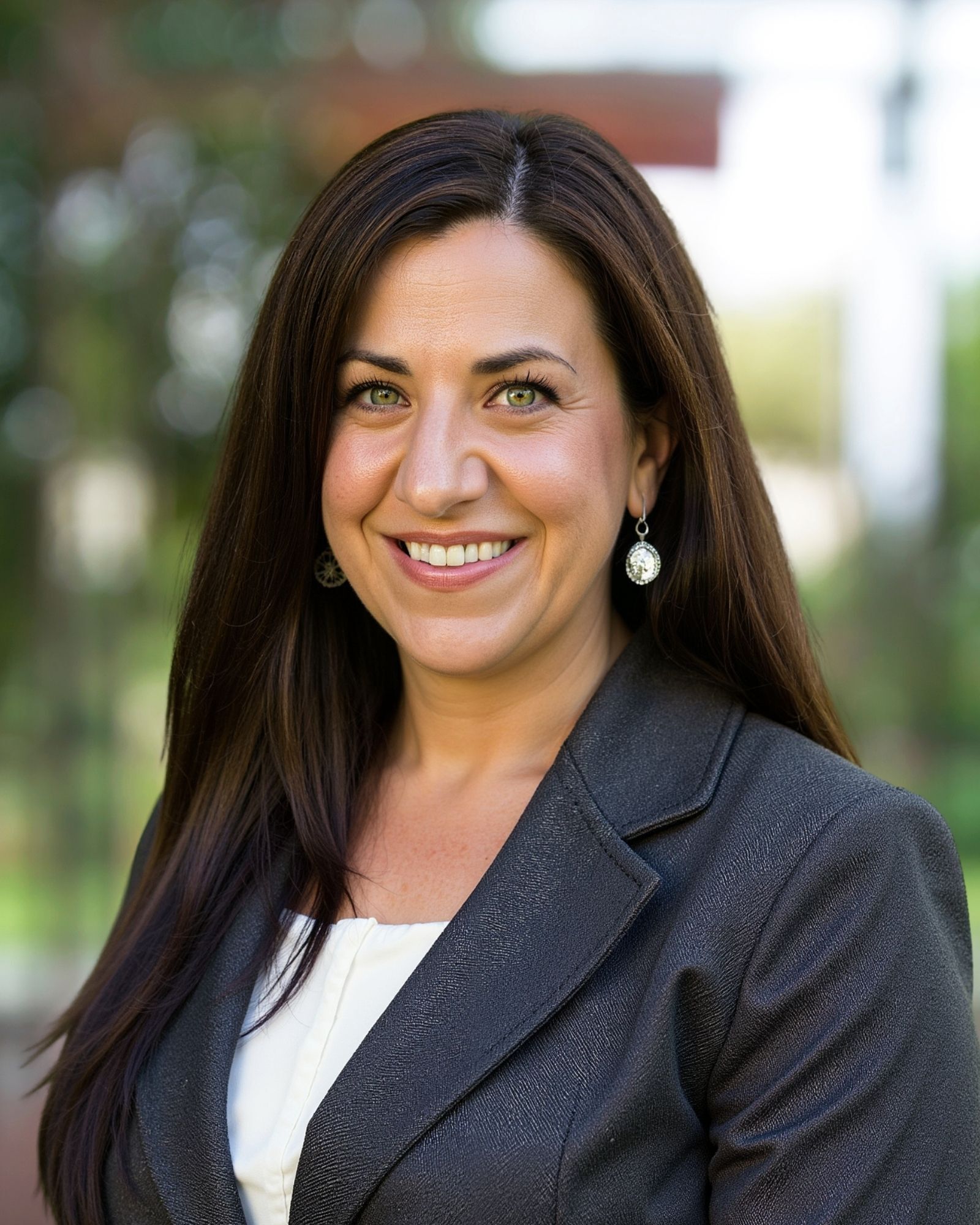Carey Ferro credits much of her success to having a healthy sense of curiosity. Asking questions and understanding how things work at an early age can help one shape and grow technology as a lifelong passion. But even more important, Carey says learning to practice reflection is an essential part of continued personal growth and finding balance in one’s life. In this edition of our podcast, Carey discusses the importance of curiosity, courage, and being inspired by the Japanese concept of ikigai.
What is a typical day like for you?
Carey Ferro: A typical day for me is filled with a lot of collaboration internally across our product and technology teams, and really focusing on driving and developing strategies around what’s happening in the industry that may impact the various groups across Amex. Our team participates not only with the PCI Security Standards Council, but also with other industry bodies such as EMVCo, W3C, the U.S. Payments Forum, Secure Technology Alliance, and others. So keeping up on working groups, position papers, and other deliverables across the payments industry is really a big focus of ours.
And how did you get started in the technology or payment space? What led you to that career choice?
Carey Ferro: I came to American Express right out of college, and I knew I did not want to go into manufacturing with my industrial engineering degree and payments really sounded interesting. Luckily, I was right. There are so many different facets that I had never imagined until I got into the business. And I've been lucky that Amex has so many different viewpoints to offer playing both the issuer and acquirer, and then having a complete network with different partners that connect into it as well. There have been so many opportunities to learn different parts of the business and payments ecosystem overall. It's been great and best part is I've never been bored.
Have you had a role model in shaping your career path?
Carey Ferro: I give my parents the most credit because they raised me to be a very curious person who likes to understand how things work, and why things work the way they do. Both of them do what they love and they work really hard at it to make a difference. And I've also had some amazing leaders throughout my career who've encouraged me to really expand my knowledge and grow in various ways. So, early on, I was able to realize which aspects of a job really sparked my interest and engagement.
What is your proudest accomplishment in your career to date?
Carey Ferro: There was a two-year span of my career where I managed the development and facilitation of card issuance for 26 different countries that American Express did business in. We also have a huge network of partners to help expand our global footprint across the world through local bank issuing. So, it was a huge feat to accomplish and required me to learn each of the different regional and country-specific nuances, as well as understand EMV technology overall, since this was before chip cards came to the U.S. It was actually both my proudest accomplishment and probably most significant learning challenge as well. I had a short amount of time to try and figure out how best to articulate to each different country their choices, their decisions, and ensure that they could get the funding to help distribute the cards across the globe.
Do you notice a lack of women in technology? And if so, why do you think that is the case?
Carey Ferro: Compared to when I started my career, I see more women going into technology positions these days. I do think this is one area that Amex is really great at - encouraging and promoting gender equality in the workplace, but the broader world is not perfect by any means. With the digital revolution over the past decade, younger children get access to computers and phones so much earlier than they used to. So I think that's really helped open up a world of possibilities for all kids to become interested in the technology aspect. And we should continue to encourage that. It's important to really light that fire at an early age, so you can help shape and grow technology as a passion.
In your experience, does being a woman in your profession come with confidence challenges that you have to overcome, for instance, doubting your own ability? And if so, how do you overcome it?
Carey Ferro: I think everyone doubts their own abilities at one time or another. There are sometimes unique challenges when you may be the only female in the room and the negative self-talk that really can come into play, especially then. So even if it's questioning, "Why am I the only female here? Did anybody else notice? Does that mean they're going to treat me differently? Do I need to speak up more or less? If I have a question, am I going to look dumb?" I really could let my brain go on and on when it comes to self-doubt, but it is most important to stop yourself. Do not fall down that rabbit hole. Remind yourself that you are there for a reason and have confidence in your ideas and questions because you probably are not the only person in the room with that same question. So, find comfort that others have felt that way before, too. Or maybe they’re feeling that same way right then. I encourage you to have that courage to put yourself out there, because I do believe that everybody has something to offer.
Many women in the tech industry have felt that their gender has affected the way that they are perceived or treated. Have you ever been in a situation like that and how did you handle it?
Carey Ferro: I have been fortunate most of my career, not to run into this type of circumstance, but prior to American Express, I was a supervisor at a large call center in town. There was an Executive Presence training course that I took, where we were told to, dress nicely, give a presentation, and they'll give you feedback. They gave me some tips on the presentation itself and complimented my outfit, and then they suggested that I should straighten my hair to look more professional citing that, news anchors don't really have curly hair. So I was basically stunned at that comment. I don't think I said anything directly in response to it, but as a young impressionable woman, it really made me stop to reflect even more often about my appearance. Yes, my hair is crazy curly sometimes, but this is how it grows out of my head. And that's part of me. I got a little angry when I thought about it more because I'm pretty sure they wouldn't have told a guy with curly hair the same thing, but, I ended up deciding that this was one area of myself that I was not willing to give up on and I needed to be true to myself.
What do you see or hope to see as the future for women in technology roles specifically in the payments industry?
Carey Ferro: The technology space will continue to grow and expand. Security of information will always be a top priority and there's been a lot of innovation since the pandemic began and it has pushed payments and digitization forward. The need is great to have strong, creative thinkers to help enable that growth of safe commerce. So I envision plenty of opportunities for women to play critical roles moving forward.
Were you given any advice during your career that has stuck with you and, as a result, do you have a personal mantra or a quote that you live by?
Carey Ferro: The best advice I've received, always centered around the theme of reflection and growth. Reflect on what you like to do and what you're good at. Reflect on where your personal life is right now, where it's working well, where it could be better. Reflect on the boundaries you have, or maybe don't have, and then adjust. Knowing yourself and what you're willing to bend on and what you aren't, really will lead you to greater personal happiness and happiness with your job. When you can find that proper balance, I think it's magical. But it's also not just a one-time event. You have to commit to it as an ongoing process to maintain that constant growth. I've always been drawn to the Japanese concept of ikigai, and it's essentially your reason for living. Your reason for getting out of bed in the morning, you know, your motivation. It’s the intersection of four key things, what you're good at, what you love, what the world needs, and what you can be paid for. There are some excellent Ted Talks out there on “how to ikigai” and you can check it out from Tim Tamashiro.
What advice would you impart to other women about how to succeed in the payments industry or in any technology-based field in general? Is there anything that you wish you had known?
Carey Ferro: I think the biggest one for me is just to be curious. Look around, look for the why, and ask "so what?" when you're looking into things. Secondly, I would say don't be afraid of speaking up. Make sure you ask your questions. Share your thoughts. Make your voice heard. And then one of the easiest things that you can do to help succeed is join some of the industry groups at least through the email blast that everyone has out there. Even if it's just reading the headlines, you'll open up so many different perspectives and make some really great connections that will help you continue to be curious and look for that why. The last piece of information I would share is to find some key colleagues that you work with that will help you grow. Having someone to help you bounce ideas off of, keep you on track, and let you know if you're making mistakes or are veering off in the wrong direction. It's always helpful to have those key people in your life being supportive.
Great. Well, thank you so much, Carey.
Carey Ferro: Yes, absolutely. And thank you ladies too, I appreciate it.


